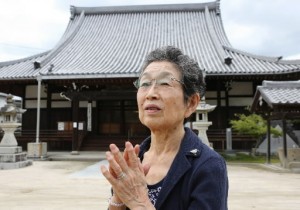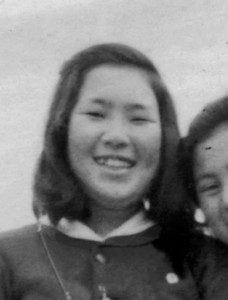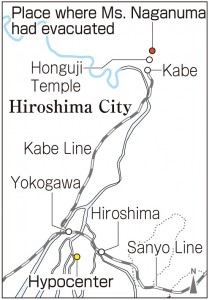Haruko Naganuma, 84, Naka Ward, Hiroshima
Oct. 20, 2015
Experienced hellish conditions while caring for the wounded
by Yuji Yamamoto, Staff Writer
Maggots squirming in the wounds of burn victims, two young boys crying for their mother...these are the memories that Haruko Naganuma (nee Kagawa), 84, had locked away inside herself after her experience caring for the injured after the atomic bombing. These were horrifying scenes that she didn’t wish to recall. But this year, which marks the 70th anniversary of the Hiroshima bombing, she read the A-bomb account left by a coworker of her father and found that he had described the same kind of events in the aftermath of the blast. Reflecting on her own experience of that time, she felt moved to finally begin sharing her memories.
Ms. Naganuma’s father, Tokuro Kagawa (1905-1986), was drafted into the army in the spring of 1945, and she was evacuated from Kyoto to Kabe-cho in Hiroshima (now part of Asakita Ward) where her grandmother lived. She then became a third-year student at Hiroshima Prefectural Kabe Women’s High School (today’s Kabe High School).
But rather than attending school, she was forced to begin working as a mobilized student at Yamato Heavy Industries (now Daiwa Heavy Industries in Asakita Ward), which produced hand grenades. On the morning of August 6, just as she was washing her hair in the bathroom at home, preparing for a week of working the night shift, there was a sudden flash of blinding light. As she wondered if shampoo had gotten into her eyes, she heard an enormous roar. Stepping out of the house, she saw a huge mushroom cloud rising into the sky above the city.
At around noon, as she was making her way to work, she was horrified to see a truck passing by that was piled with the bodies of burn victims in the open bed. At the time, she had no idea what she was seeing, and afterward thought they must have been ghosts. When she arrived at the factory, she was told to go home because a very powerful bomb had been dropped on Hiroshima, and so she returned to her grandmother’s house.
The following day, Ms. Naganuma went to nearby Honguji Temple to help care for the wounded there. What she saw were scenes straight from hell. The inside of the main temple hall, as well as the corridors, were full of people that had been hideously burned. Her task was to use chopsticks to remove the maggots that had infested their wounds and deposit them into a bin. When the container grew full, she threw it into a fire that had been made on the grounds of the temple. But by the time she had returned to the burn victims, their wounds were already again infested with maggots. The stench from their wounds was made even worse by the scorching midsummer heat.
She heard feeble voices crying, “Mother, Mother.” The voices came from two boys, around ten years old, who seemed to be brothers, but their mother was nowhere to be seen. Ms. Naganuma was overcome with sorrow.
When she arrived at the temple the next morning, she found that most of the people were gone. They had likely died during the night. The two boys were no longer there, either. She continued to care for the injured at the temple for a week.
Five years later, she married Hiroshi Naganuma, who was also an A-bomb survivor. They had two boys, but she was busy raising them and didn’t tell them about the atomic bombing. She may also have dismissed the event from her mind, considering it part of her past.
However, when she would engrave kanji characters in woodcuts, her hobby, she incorporated her desire for peace into her work. Especially when engraving the character for “yomigaeru” in Japanese, which means coming back into existence, on a camphor tree which survived the atomic bomb, she thought about the two boys she saw at Honguji Temple. They had persisted in her memory and she felt deep grief for the innocent life they had lost.
Ms. Naganuma’s husband passed away at the age of 92 this past July. Afterward, she found the A-bomb account written by a man who had worked with her father at the Hiroshima branch of the Mitsubishi Bank (today’s Bank of Tokyo-Mitsubishi UFJ). His name reminded her of days long past and so she read through his account without stopping. As she did, the hellish destruction and death wrought by the bomb came back to her full force. She felt reeled back to that time 70 years ago, which led to reflecting on her own experience.
Ms. Naganuma said, “I couldn’t talk about my A-bomb experience because I wanted to escape from all those terrifying memories. War must never be condoned. Without peace, we can’t do anything.” Whenever she recalls those days, tears run down her cheeks. She prays that this sort of tragedy will never be repeated.
Teenagers’ Impressions
Conveying her thoughts and feelings to others
I thought her words, that we can’t do anything without peace, were really profound. Peace gives us freedom in so many forms, like the chance to go to school. Ms. Naganuma once kept her painful memories of the war hidden away, but she agreed to be interviewed and shared her thoughts and feelings with us. I now see it as my duty to convey them to other people. (Nako Yoshimoto, 16)
Sadness over young people working for the war effort
Women and children were forced to work because men had to go off to the battlefields, but during the war, this was taken for granted. When I think of girls around my age, working in factories day and night to manufacture weapons, it makes me feel so sad. The thought of it is just unbearable. But if I had lived in those days, I would have followed the order to work, too. War is so awful and we must raise our voices against it. (Ayumi Uehara, 17)
Never want to see such a dreadful sight
Ms. Naganuma was only 14 years old when she was faced with the task of removing maggots from the wounds of survivors who had been severely burned. Although she felt scared, she did her best to care for these people who were suffering such pain. I’ve never even seen maggots and I can’t imagine them infesting a person’s body. I never want to see such a dreadful sight. We should never permit another war to occur, which would again hurt innocent people. (Kana Fukushima, 16)
(Originally published on October 5, 2015)









